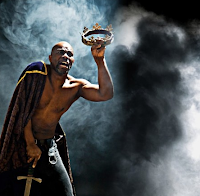This is a piece I wrote as an example for a student working on the OCR English Language exam. It would work equally well for AQA, WJEC, Edexcel or Cambridge IGCSE as it’s autobiographical. I mean, it isn’t really true as I made it up. But it’s believable. This is the key!
It’s short, and could be improved by a bit of editing, but it was produced under exam-type conditions so I thought it might be interesting to see. It’s not long enough for controlled assessment, and would need one or two more clearly drawn characters, a bit of dialogue and maybe a flashback.
It really helps to write about something you know. But it doesn’t have to be dramatic. Often we don’t want to write about those moments anyway (parents’ divorce, death, etc).
Your local newspaper has a column called: Help!
Write a piece about a time when you or someone you know needed some help.
It was the dreaded Nativity Play and I needed help.
I was six, lost in a room filled with glitter, feathers and old brocade curtains tied about with rope. Escape routes were clearly marked from every classroom, but when I looked towards the door, it was too late; they were already here. The sharp toothed, long-clawed audience was foaming at the edges of the stage.
Trapped in the littlest classroom, we crushed together, changing to get ready. My heart beat in my ears. Excitement threaded through with fear.
The tiny primary school seemed monstrous at the time; the classroom like a cavern littered with a shaken up Nativity Set. Joseph, with his beard on his head, was pretending to be a goat. Goat Joseph chewed on the end of Mary’s robe as she screamed, laughed and tried to get him off by hitting him over the head with the plastic baby Jesus.
‘That’s no way to treat Our Lord,’ Miss Minnis said, rescuing our plastic Saviour.
Last year I was one of the sheep. All I had to do was try not to fall off the edge of the stage, which sounds easy until you get up there with the bright lights and all those faces looking at you.
This year, I had only two lines:
‘Yes, it’s a very nice inn.’ And ‘Steady on, dear.’
Nine words. Do you know how many ways you can mix up nine words, thread them into nonsense, drop them into the ground, and stare long as you like, looking for where they might have fallen? Billions. Almost.
It was time to go on.
We were pushed in a crush towards the hall, to the lights; a sea of faces turned on like lightbulbs, waiting to eat us alive.
I don’t remember much of the play. I didn’t even remember my lines. My mind went blank in the great empty silence. But what I do remember is the upturned, smiling face of my class teacher, mouthing:
‘Steady on, dear.’
Author’s Notes
I wrote this in the first person as it was meant to be true, and put in some dialogue to give it a feel as if it was happening now. I also picked up on the little details I remember from my own kids’ nativity play – things like the plastic doll, brocade tied with rope.
Alliteration and Assonance (repeated vowel -i-)
Miss Minnis
Metaphors
The sharp toothed, long-clawed audience was foaming at the edges of the stage
Simile
a sea of faces turned on like lightbulbs
List (used to create mood and set scene)
a room filled with glitter, feathers and old brocade curtains tied about with rope.
Repetition for effect
I don’t remember much of the play. I didn’t even remember my lines. … but what I do remember…
Half Rhyme
We were pushed in a crush
Long Sentences for Effect + Fragment
Do you know how many ways you can mix up nine words, thread them into nonsense, drop them into the ground, and stare long as you like, looking for where they might have fallen? Billions.


